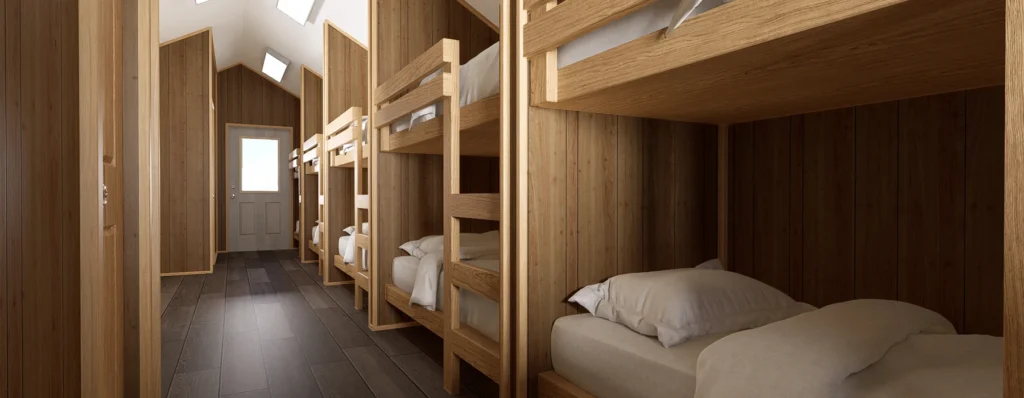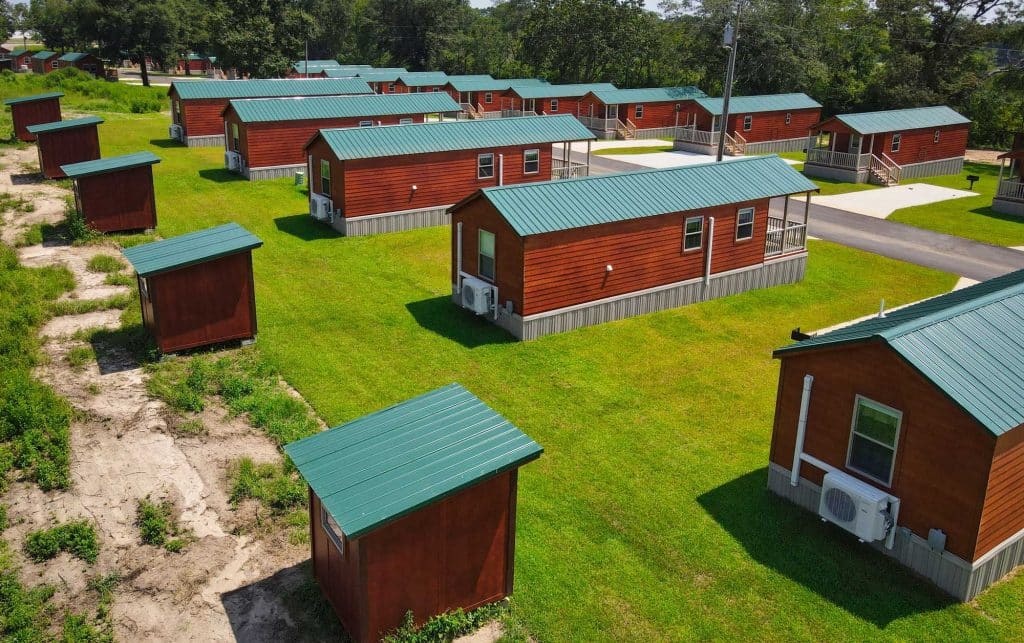Navigating Work Visas for International Staff:
A Guide for Campground Owners

The United States’ job market is buzzing with many opportunities and realized as many as 4.5 million new jobs in 2022[1] . However, many of those job openings went unfilled following the great resignation post-pandemic. The campground industry is one of those hit hard with staff shortages. Facing the challenge of filling in the missing hands needed to keep things running smoothly, campground owners can take advantage of the exchange visitor program that allows international students and even non-students to fill essential positions in camps, while the international employees also enjoy the opportunity to earn and travel while in the U.S.
Staff Shortage Cause Campgrounds to Struggle
After the travel bans had been lifted post pandemic in 2022, national park visitation saw a record high [2] as visitors scrambled to embrace the outdoors after being restricted indoors for several months. But some national parks weren’t able to keep up with the surge of visitors because they were short on staff. Fortunately, campground owners don’t have to navigate these shortages alone. There are several ways to fill essential roles and keep operations running smoothly, and one of them is sourcing talents overseas made easier by the Exchange Visitor non-immigrant visa program or the J-1 visa. Though a sponsor is needed for each J-1 applicant, an employer looking to hire one of the J-1 visa holders need not be a sponsor. There are government-approved summer camp direct placement agencies that campgrounds can turn to for their international staffing needs.
Staff Up Smart: Agencies and Organizations to Help You Find the Right Match for Your Campground
There are several placement agencies and organizations in the U.S. that can help campground owners and administrators find the right talent to fill positions at their camp. Below is a list of some of those agencies:
Agency/Organization Name | Telephone | Website | |
American Camp Co | 0151-013-154 | ||
USA Summer Camp | USA Summer Camp – UK: (+44) 0121 411 9165 USA Summer Camp – Ireland: (+353) 1 533 0818 | – | |
Camp Counselors USA | +1 (415) 339 2728 or +1 (800) 999-2267 | ||
Cenet | 1-866-512-3638 (free within the U.S.) or 1-573-335-7111 (outside the U.S.) | ||
Smaller Earth | UK (+44) 0151 808 0909 | ||
InterExchange | (800) 597-1722 or emergency – (917) 741-5057 | ||
AmeriCamp | 1-888-224-0450 (Toll Free) | ||
Camp America | +44 207 581 7373 (UK contact) or 1-866-222-2074 (US contact) | ||
BUNAC | +1 3323303222 | ||
Camp Leaders | 1-866-803-7643 | ||
Wild Packs | 01313 806555 | ||
American Summers (An IENA Company) | +1-888-724-4292 (IENA US Office) | ||
Odyssey Camp | +1-310-421-0107 |
Tips to Navigate the Legalities for Visa Requirements
There are numerous visas available for temporary workers. Mostly, international camp staff travel on a J-1 cultural exchange visa. But navigating the J-1 visa application process can be tricky if you are not well-versed in the procedures. Below is a guide for employers, sponsors, and international applicants.
The following are some basic requirements for employers looking to host J-1 visa holders:
- Prompt Communication with Sponsors: Inform sponsors promptly about any changes or concerns regarding the training/internship plan.
- Emergency Contact: Immediately contact sponsors in case of emergencies involving interns or trainees.
- Legal Compliance: Abide by all relevant occupational, health, and safety laws.
- Adherence to Rules and Regulations: Follow all rules and regulations set by the J-1 visa program sponsor.
- Resource Maintenance: Ensure adequate resources, trained personnel, and equipment are available to support the interns and trainees.
- Quality Supervision and Mentoring: Provide consistent, high-quality supervision and mentoring from experienced staff.
- Valuable Learning Experience: Offer structured activities for knowledge gain, including classroom training, rotations through multiple departments, on-the-job training, conference attendance
- DS-7002 Form Completion: Fill out the DS-7002 form, detailing the internship/training placement plan. [4]
Here are step-by-step instructions for how to apply for exchange staff:
- Complete the Online Nonimmigrant Visa Application Form DS-160
- Upload a photo adhering to the specified requirements
- For applicants between the ages of 14 and 79, schedule an appointment for visa interview at any U.S. Embassy or Consulate
- Prepare for your interview and pay the non-refundable applicable fees
- Gather and prepare the required documentation like passport, Form DS-160 confirmation page, application fee payment receipt, photo, Certificate of Eligibility for Exchange Visitor Status, Form DS-2019, and Form DS 2019 or the Training/Internship Placement Plan
- Additional documentation as needed
- Attend the visa interview and wait for visa approval [5]

Fair Treatment of Workers
Temporary foreign workers have been essential to the U.S. economy for a long time because they provide several industries with a critical labor force. Their crucial contribution to the country’s economy warrants fair treatment from their employers, especially related to housing since it directly impacts their welfare, morale, and productivity. But prioritizing and ensuring that staff housing meets the stringent standards of regulatory authorities is often ignored.
OSHA and HUD Regulations for Employee Housing
Key authorities have set regulations for employers to follow so they will be able to comply with safety, environmental, and operational standards. This helps ensure that the business’ reputation will not be damaged while also protecting the welfare of the workers, thus avoiding any legal implications.
The Occupational Safety and Health Administration (OSHA) is responsible for employee safety, including housing, while Housing and Urban Development (HUD) provides housing standards applicable to workers.
OSHA requires employees to comply with its General Duty Clause which mandates a safe working environment free from any known hazards likely to cause death or serious harm.
HUD has established minimum property standards for construction, materials, and facilities plus maintenance requirements for employee housing. Employers also must comply with space requirements, such as providing at least 50 square feet (about half the area of an apartment bedroom) of floor space per occupant and a ceiling height of at least seven feet, and providing essential amenities, including ventilation and lighting. These standards aim to ensure a safe, sanitary, and decent living environment for the workers.

Tiny homes, cottages, and cabins built to park model standards meet the government requirements for temporary housing and can help employers provide onsite housing that can help make their temporary workers’ lives much easier. One benefit is that they don’t need to spend money on travelling to and from their accommodation since the tiny homes are designed to be lived in with a private bathroom and cooking area and can be easily installed and relocated. With low acquisition and maintenance costs, employers can provide safe and secure onsite housing for their staff while keeping overhead costs low.
It is important for employers to take a proactive approach for the safety of their workers and to comply with the government standards for employee housing. By addressing the regulatory requirements of employee housing, employers can ensure a safe and positive experience for their international workforce, which strengthens the overall success of their business.
References:
[1] Ferguson, S. (2024, March 28). Understanding America’s labor shortage. U.S. Chamber of Commerce. https://www.uschamber.com/workforce/understanding-americas-labor-shortage
[2] National Park visitation sets new record as economic engines. U.S. Department of the Interior. (2023, August 21). https://www.doi.gov/pressreleases/national-park-visitation-sets-new-record-economic-engines#:~:text=The%20National%20Park%20Service%20report,were%20in%20park%20gateway%20communities.
[3] Batalova, J. (2024, March 13). Frequently requested statistics on immigrants and immigration in the United States. migrationpolicy.org. https://www.migrationpolicy.org/article/frequently-requested-statistics-immigrants-and-immigration-united-states
[4] A brief guide to J-1 visa requirements for employers. J1 Visa Exchanges. (2024, April 1). https://www.j1visaexchanges.com/blog/a-brief-guide-to-j-1-visa-requirements-for-employers/
[5] US Department of Statement- Bureau of Consular Affairs. (n.d.). Temporary Worker Visas. https://travel.state.gov/content/travel/en/us-visas/employment/temporary-worker-visas.html


